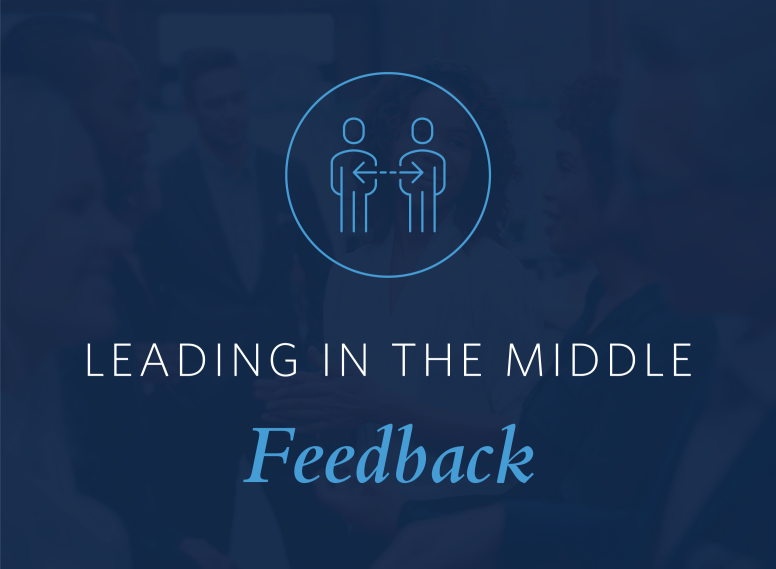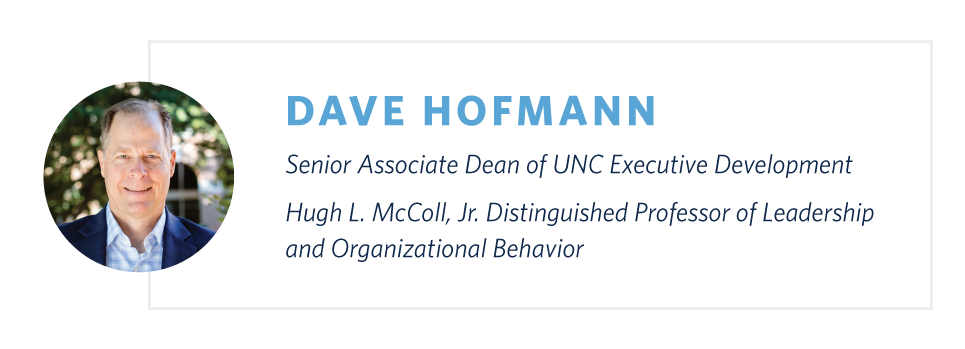Thought Leadership
“One Question, One Minute, One Idea” for Better Feedback

This article is part of our Leading in the Middle Series. Each month, we will share a Thought Leadership article by UNC Executive Development Associate Dean Dave Hofmann on how to lead effectively from any position in an organization.
I was having dinner with a friend at a restaurant that had just opened. The owner zipped by and asked us quickly, “How is everything?” We said, “Umm, it’s great” being caught off guard and not knowing where to start.
Well, it wasn’t very great and as we walked out, I thought more deeply about soliciting feedback within organizations, how people typically ask for it, what they often want, and the response folks frequently give. And, then, of course, I thought about how we could improve this process by asking ONE question resulting in better input and improved performance.
Overly Broad Questions & Do They Really Want Feedback
The question asked by the restaurant owner is fairly typical. Right after giving a key presentation or leaving an important meeting — often while walking down the hallway or lingering in the Zoom room — someone will ask, “So how do you think it went?” or “How did I do?” This is problematic for several reasons. First, immediately after a big event (meeting, presentation, or restaurant opening), people are often looking for affirmation, not critique. Big events are stressful and often people have some doubts about their ability to rise to the occasion and confidently step forward. So, what they are really asking is “Did I do ok?” and “Are we good?” They want some cathartic affirmation, not a coaching critique.
Second, the “how did it go” question is overly broad. People often struggle to answer this question— or at least I do. Where do I start? What type of feedback are they looking for? Do they really want feedback right now? Are they prepared to process it if I do give it? And so forth and so on. Even assuming you come up with answers to all of those questions, as John Sumanth and I discussed a while back in Harvard Business Review, overly broad solicitations do not produce the best ideas even if provided.
An Alternative Question
Assuming you actually want input, you want to make it easy on the other person. They don’t call these difficult conversations for nothing — most everyone on the planet is at least moderately (or significantly) anxious about giving feedback. This is particularly true for providing feedback to someone with more power. As Edgar Schein argued so well in Humble Inquiry, if leaders want feedback THEY have to seek it out, humble themselves (in the sense of inverting the power dynamics), and engage in humble inquiry. But, even then, these situations are difficult.
I think a great question for everyone to ask — irrespective of their power and the power of those whom they are asking — is quite simple.
What is one idea that could have made it better?
This question is simple, it reduces the cognitive burden on the giver, it communicates you ARE interested in ideas, and it limits it to one idea making it easier to process and receive for you. Note also, that the question does not ask for feedback, but instead, it asks for an idea. Feedback focuses individuals on what did happen and what could change about what happened. Ideas for making it better opens up the aperture to things that didn’t happen, but could have happened.
Here are a few quick thoughts about introducing this into your leadership toolbox:
- After a key event or presentation, simply ask a few folks who were there if they could give you one idea about how it could have been better. Shoot them a quick email/DM, asking them to take one minute to provide you with one idea about how it could have been better.
- Or you could give folks a heads-up that you’ll be asking. “Hey, I’m about to give this client presentation. When it is over, I would love for you to take one minute and give me one idea about how it could have been better.”
- Create a practice within your team at the end of key meetings, milestones, or moments to ask folks to “take one minute and think about one idea that could have made it better.”
- Finally, don’t overdo it. I would not recommend doing this after every meeting because it begins to lessen the impact and it could be perceived as a “check the box” activity where everyone has to say something every time. Asking more sparingly signals to others which moments are critical and important and where you really are seeking to improve. If you use this in an ongoing way, you will create a safe environment where folks will provide ideas proactively for situations they view as important.
Note here, that you are not giving them a choice to provide an idea or not — you are setting the expectation that they will be able to come up with something. Setting expectations is another topic John and I talked about.
Note also that you are not asking for a full explanation, you are simply asking for an idea. It will be on you to process the ideas, figure out which are most beneficial, seek clarification where/when necessary, and decide how you will follow up with those providing ideas to close the loop. All you need to say at this point is a simple “thank you, super helpful,” or “great idea,” or “much appreciated,” or “interesting idea, I’ll have to think about this more — I’ll get back in touch to discuss.”
In sum, let’s make giving us feedback easier and in the process get better ideas by leveraging three simple things:
One question, one minute, one idea to make it better.
Of course, over time folks need to see you acting on the ideas, but that’s another story for another time.
To close the story, I have reflected on how much better I would have responded to the restaurant owner if he would have stopped by our table and said:
“Welcome to XXX restaurant, I hope you are enjoying your evening. I don’t want to take much of your time or intrude on your dinner, but I would love to stop by as you’re about to leave, take just one minute of your time, and get one idea that could have made your experience better?”
I would have had an idea or two. And because I would have known by him asking this question that he was interested in getting better, I would have gone back — which we have yet to do.
